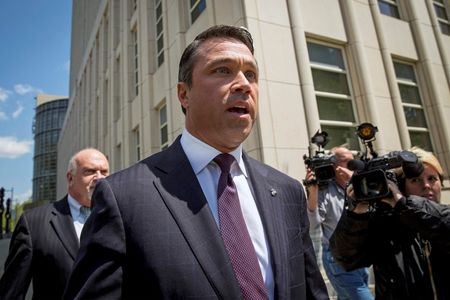By Barbara Goldberg
NEW YORK (Reuters) - Scandal, indictments and even felony convictions did not necessarily keep voters from backing candidates for U.S. Congress this year.
Voters on Tuesday threw their support behind a candidate in New York, despite his upcoming tax evasion trial. Allegations of sexual harassment seem to have proved no obstacle to election for a candidate in California. And a rap sheet that includes prison time for corruption may not stand in the way of a congressional hopeful in Louisiana.
Representative Michael Grimm, a Republican from New York's largely Republican borough of Staten Island, easily won re-election to a third term - ahead of his Feb. 2 trial for fraud, perjury and conspiracy.
"Better the scoundrel of our party than the scoundrel from the other party," Michael Genovese, a political science professor at Loyola Marymount University in Los Angeles, said on Wednesday, describing voter sentiment.
Republican challenger Carl DeMaio, an openly gay former San Diego city councilman, was clinging to the lead to represent California's 52nd Congressional District - with mail and provisional ballots yet to be counted - despite being accused of sexual harassment by his male former campaign policy director.
And in Louisiana, former Governor Edwin Edwards, a Democrat who spent six years in the House of Representatives and then eight years in prison for racketeering, finished in the top two on Tuesday and will advance to a Dec. 6 runoff.
"People hate Congress, but they love their legislators," said Julian Zelizer, professor of history and public affairs at Princeton University.
"They become very attached to them, and they often see them as part of their community. And so when they are under investigation and when they're the focus of scandal, people become defensive of the accused rather than joining in the frenzy," he said.
Returning a scandal-plagued candidate to Washington to write the nation's laws is part of America's political heritage, said Lara Brown, associate professor in the Graduate School of Political Management at the George Washington University.
From 1966 to 2002, two-thirds of the more than 160 incumbent House members who were accused of engaging in scandalous behavior and chose to run won re-election, she said.
"They hold their nose and vote for their party."
Sometimes the stench of scandal is just too much, though, and voters reject a controversial candidate, Genovese said.
"The more a candidate stinks up the room, the less likely folks would be to vote for him or her," Genovese said.
A videotape of Republican Representative Vance McAllister in an extramarital kiss with a female staffer apparently was not forgiven by voters who rejected his re-election bid for Louisiana's 5th Congressional District.

On the municipal level, voters appeared to have had enough of Vincent "Buddy" Cianci after supporting him during two stints as mayor of Providence, Rhode Island. His first run ended with his felony assault plea in 1984, and his second tour at City Hall came to a close in 2002, when he was forced to resign and begin serving a five-year sentence for corruption. Cianci was defeated on Tuesday in his effort to serve in City Hall for a third time.
(Reporting by Barbara Goldberg; Editing by Frank McGurty and Douglas Royalty)
